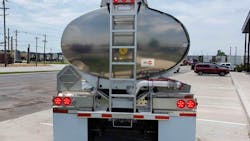Court upholds FMCSA’s denial of Intellistop’s exemption request
A U.S. appeals court upheld the Federal Motor Carrier Safety Administration’s denial of Intellistop’s exemption request to allow all commercial motor vehicles to use its pulsating brake lamp device, citing in its July 7 decision concerns with module failure and driver confusion, and a need for more data on flashing existing lamps.
A recently retired FMCSA engineer calls the result disappointing, but not unexpected.
Luke Loy, who retired in June after 33 years with the U.S. Department of Transportation, both with FMCSA and the National Highway Traffic Safety Administration (NHTSA)—and whose name is on FMCSA’s Oct. 7 denial, as well as multiple parts and accessories exemptions the agency granted over the last several years—insists California’s long-standing vehicle code that permits flashing stop lamps on any motor vehicle is all the evidence Intellistop needed to present to establish FMCSA’s ruling was “arbitrary and capricious.”
Unfortunately, he lamented, that wasn’t part of its legal team’s argument.
“It would have been nice if the court had overturned the decision, but the way [Intellistop president Michelle Hanby’s] lawyers made their case isn’t necessarily the way I would have made it,” he told FleetOwner affiliate Bulk Transporter.
Appelate court ruling
The three-member panel, consisting of U.S. Court of Appeals, District of Columbia circuit judges Karen Henderson, Cornelia Pillard, and Florence Pan, wrote “We believe the FMCSA acted reasonably in denying Intellistop’s exemption and adequately explained that Intellistop provided insufficient data ‘to support a blanket exemption for industry to alter the performance of a required lamp covered by the FMCSRs and FMVSSs.’”
See also: Intellistop pulsating brake lamp exemptions flood Federal Register
The court elaborated on its decision, writing “FMCSA found Intellistop’s data insufficient for it to determine that the requested exemption would result in a level of safety equivalent to that required by its regulations,” citing “Intellistop’s failure to provide data showing that industry-wide pulsing of existing (that is, steady-burn) brake lights, rather than supplemental pulsing lights, would not cause driver confusion or distraction,” and emphasizing “Intellistop provided no data to demonstrate ‘that the installation of the device would safely interact with the [commercial motor vehicle’s] existing systems or to support its claim that a malfunction of the Intellistop device would result in the brake lights returning to [original equipment manufacturer] functionality.’”
The panel further addressed the pulsating brake lamp studies Intellistop cited in its Sept. 7, 2022, petition to the court for an expedited decision on its exemption application—filed in December 2020 and published in the Federal Register in June 2021—and the differences between Intellistop’s request and similar exemptions granted to Groendyke Transport, Grote Industries, National Tank Truck Carriers, and Waste Management.
The judges sided with the federal agency’s previous determination in every case.
“It’s unbelievable,” Hanby said. “I shouldn’t be surprised, because when I listened to the court case [online], Judge Pillard shocked me by interrupting our lawyer’s opening statement 1 minute, 5 seconds in, but I still am.”
Agencies unaligned
FMCSA noted in its long-delayed denial that rear-end crashes are a serious issue, accounting for approximately 30% of all crashes, and large trucks are “three times more likely than other vehicles to be struck in the rear in two-vehicle fatal crashes,” according to data on crashes that occurred between 2010 and 2016. FMCSA also stated it is “deeply interested in the development and deployment of technologies that can reduce the frequency, severity, and risk of rear-end crashes”—technologies like Intellistop’s.
See also: FMCSA denies Intellistop’s exemption request
Proponents also insist Intellistop’s module is safer, easier, and cheaper to install than competing solutions, public comments overwhelming supported an exemption, and fleets that have deployed the device report reducing rear-end collisions. However, previously granted exemptions only allow pulsating supplemental lamps, while Intellistop’s module pulsates the existing brake, clearance, and I.D. lamps on commercial motor vehicles, which must maintain “steady-burning” brake lamps, as mandated in the Federal Motor Carrier Safety Regulations (FMCSRs), and Federal Motor Vehicle Safety Standard (FMVSS) No. 108. That distinction means Intellistop’s exemption request encroached on both FMCSA and NHTSA authorities, because while FMCSA regulates the “in-use” operation of commercial motor vehicles over 10,000 lb. in interstate commerce, NHTSA oversees the safety of all newly manufactured vehicles, equipment, and technology.
And, as previous reporting indicates, the agencies aren’t aligned—despite sharing their safety mission. FMCSA intended to grant the exemption, as it did with numerous other parts and accessories requests, but NHTSA wanted to block it, saying it would “make inoperative” the brake lamps installed in compliance with the applicable FMVSS. That jurisdictional disagreement relegated Intellistop’s application to bureaucratic limbo for nearly two years—far beyond the federally mandated 180-day window—forcing Hanby on Sept. 7, 2022, to petition the appellate court to compel FMCSA to render a decision.
“NHTSA pressured FMCSA to deny the original exemption, disavowing the original safety data from NHTSA’s own 2010 research (which cost the agency millions of dollars to conduct) that said pulsing brake lights reduce rear end collisions,” Hanby asserted.
An email recently obtained by FleetOwner affiliate Bulk Transporter that outlines FMCSA’s intent to grant Intellistop’s exemption further supports that idea. The 3,500-word explanation concludes with: “The standard for FMCSA’s exemption authority is broad and does not require an affirmative showing that a potential exemption ‘would achieve’ an equivalent level of safety, only that an equivalent, or greater, level of safety is likely to be achieved if the exemption is granted. Second, data drives FMCSA’s review process. In this case, the available data indicate that the product will not result in an adverse impact on safety, but rather will help reduce rear-end crashes. Third, FMCSA recognizes the apparent conflicting authority with NHTSA but believes that any conflict can be reconciled by placing conditions and limitations on the exemption.
“In the end, FMCSA’s safety mission, and its legal authority over the commercial motor vehicle industry, warrant granting Intellistop’s request for exemption on behalf of motor carriers.”
See also: Intellistop’s pulsating rear lamp module caught in bureaucratic limbo
After FMCSA’s NHTSA-coerced decision, Hanby amended her petition to argue that the decision was arbitrary and capricious, but the appellate court was unmoved, apparently unaware (along with NHTSA and FMCSA) that California Vehicle Code 25251.5(e)—which states “Any stoplamp or supplemental stoplamp required or permitted by Section 24603 may be equipped so as to flash not more than four times within the first four seconds after actuation by application of the brakes”—has permitted flashing existing brake lamps for four decades, plenty of time to generate data on adoption rates, and any “unintended consequences.”
“Did NHTSA ever tell California this was an unsafe technology?” questioned Loy, who served in FMCSA’s Vehicle and Roadside Inspection Division. “Because California doesn’t mandate it, but they sure as heck allow it. So how can you sit there as NHTSA and say ‘Well, we don’t know what the unintended consequences are.’ Well, why don’t you ask California? It’s only the most populous state in the union.”
Fighting for safety
The court also latched onto the newly raised concern of Intellistop’s device malfunctioning, thus rendering brake lamps inoperable, but the argument is disingenuous because supplemental pulsating brake lamp solutions still tie into the same brake circuit, so could theoretically make inoperable the existing brake lamps. Still, Hanby on July 10 submitted further evidence that brake, clearance, and I.D. lamps revert to normal OEM function if the module fails, hoping to prevent that argument from resurfacing in the seven Intellistop exemptions filed by fleets in February, as per FMCSA’s denial suggestion.
Those Feb. 1 requests also have received strong support, with 38 of 49 comments favoring the exemptions. Yet they, too, have languished in the Federal Register without a decision for more than 180 days. Still, Hanby isn’t planning further legal action at this time, instead hoping FMCSA eventually will grant the exemptions, spurring more fleets to flood the agency with individual applications.
“I could take it to a higher court, but who can afford that? And that’s another couple of years of litigation,” Hanby said. “You’re talking millions of dollars. And the truth is people are still going to use my product. There are fleets that are fed up. They don’t trust that FMCSA is making the best choices for their safety.
“So they’re taking matters into their own hands.”
This article originally appeared on Bulk Transporter, a sister site of FleetOwner.
About the Author

Jason McDaniel
Jason McDaniel, based in the Houston TX area, has nearly 20 years of experience as a journalist. He spent 15 writing and editing for daily newspapers, including the Houston Chronicle, and began covering the commercial vehicle industry in 2018. He was named editor of Bulk Transporter and Refrigerated Transporter magazines in July 2020.
